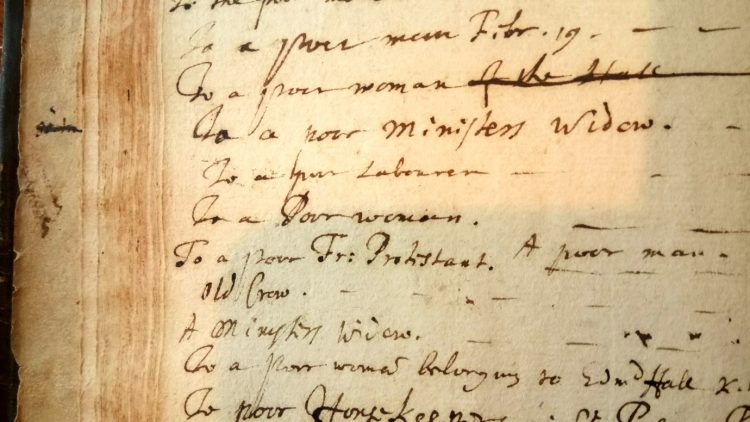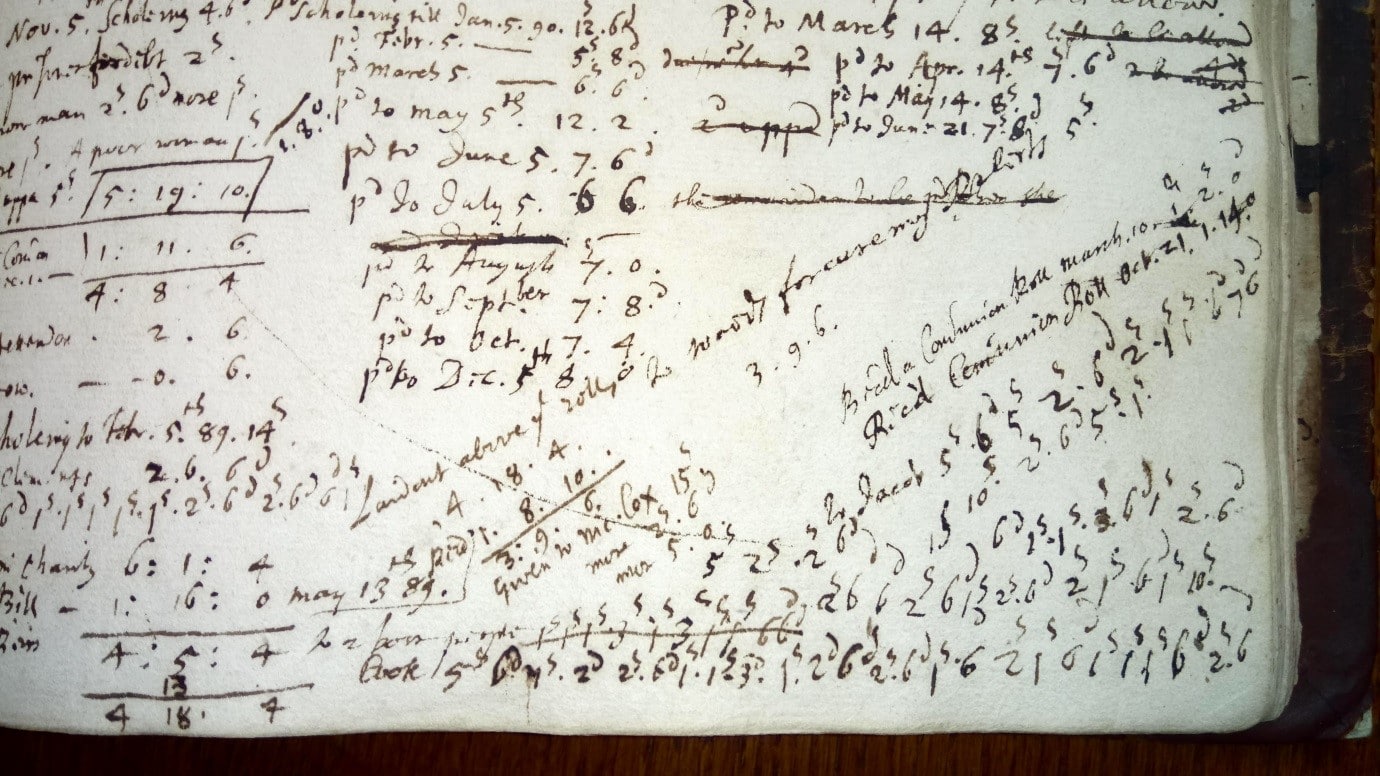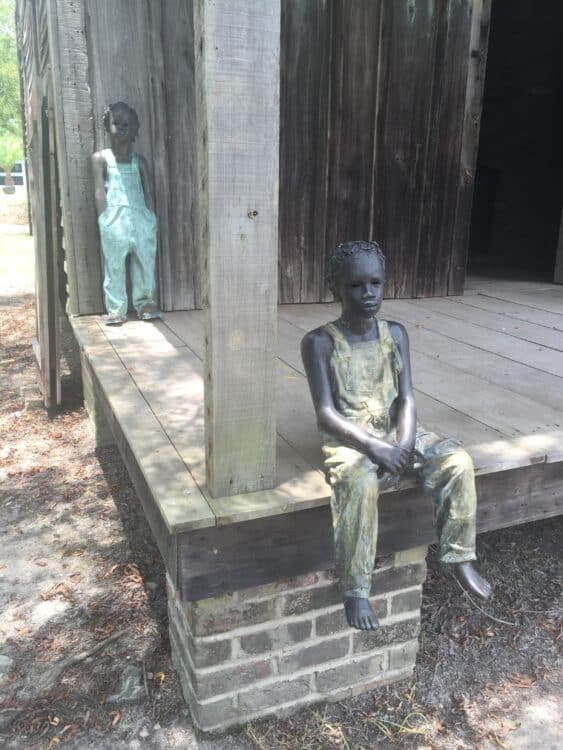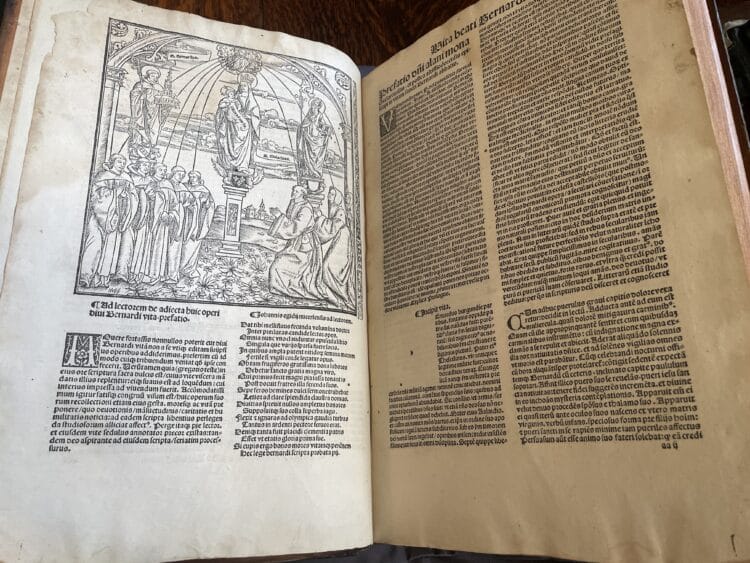Charity begins at home
14 Oct 2019|Rob Petre
- Library, Arts & Archives
The oldest record still held by the Hall’s archives is the ‘New Leiger [Ledger] Book’ started by Stephen Penton (Principal, 1675-1684) when he took over the Hall from Thomas Tullie. As well as more formal accounts for Hall business (items include repairing the boghouse) and lists of Hall valuables, a later Principal, John Mill (1685-1707) kept an account of charity money given away by him during the year 1689-1690 – although his account keeping is more scruffy than is usually the case.

Reading these haphazard accounts reveals some fascinating details about life in the 1680s. Most of the entries are for the generic ‘poor’, with few names but occasionally some detail is given: a minister’s widow of Little Compton in Warwickshire is given five shillings, as is a minister’s widow with her children; three other donations to ministers’ widows are listed. Among the named recipients are “Goody Becham”, “Goody Parker” and “Old Crow”. It must be assumed that many of these entries for the poor are for local men and women (with one entry specifically for poor housekeepers in the parish of St Peter in the East) but there are disbursements for Norfolk, Kingston, Stafford and for “Poor people in Yorkshire”. This last entry is for 5s – not a lot for the paupers of so large a county.
Mill also seemed concerned for the welfare of prisoners: those in the main Oxford prison were given 5s and those in the Bocardo at North Gate received £1, while a prisoner for debt received 2s 6d. (As an aside, it has been claimed that the word Bocardo derives from ‘bochord’, the Old English word for an archive store, although this is not confirmed by the Oxford English Dictionary).
The accounts show how fire was a real problem; one poor man is given 2s 6d when he is burnt out of his house, as are poor people of Weston whose house was lost in the same way; and after what seems like a major fire in St Clements, Oxford, Mill donated £2 2s 6d to the cause.
It is funny how national and international events can be recorded in such local, administrative archives: 2 officers from the disbanded army in Ireland are paid 10s; a ‘poor Grecian’ is given 5s; and the Hall gave 5s via an intermediary called Squib for a man to be redeemed from slavery in Algiers. (Redeeming such slaves is a common entry in accounts for this period, which may seem a bit odd – but in the 17th century a group of Barbary pirates operated with impunity in the Bristol Channel and the strange story of the Campden Wonder includes a 70 year old man kidnapped in 1660 into Turkish slavery, from rural Gloucestershire). Mill also helped out French refugees, namely 2 poor French men, a French woman and her children and a ‘poor French Protestant’ (see image), presumably a Huguenot fleeing the increasing intolerance of Louis XIV after he had revoked the Edict of Nantes that had safeguarded certain Protestant rights in France.
But some of the entries bring the charity much closer to home; 2s 6d for a ‘poor woman belonging to Edmund Hall kitchen’, 2s to the ‘poor woman who washes the dishes’ in the Hall and £1 to Nicholas Cox, the Hall Manciple (sort of the equivalent of the Domestic Bursar) on his leaving Oxford. Mill also paid £3 9s 6d for one Woods to cure Roberts – possibly Edward Roberts, a poor student from Wales who matriculated in May 1690.
As is often the way with archives, there are always questions that I cannot seem to answer – who was Jacobs, who received 2s 6d? Is he the same man as Jacob, who benefited from 12 separate gifts, receiving in total £1 17s 7d? (See the picture of the scruffy accounts for some of the entries). And whose “scholeing” is being paid for on a monthly basis as a charity? If only we had more records for Principal Mill, but sadly we don’t. We only have these accounts and the material he gathered for a scholarly edition of the Epistle of St Barnabas, unpublished at the time of his death in 1707.
For comparison purposes, a wage of £1 in 1690 is roughly equivalent to a wage of £2000 today; so a gift of 2s 6d is about £250 – see https://www.measuringworth.com/calculators/ukcompare/

Read more on our blog
Category: Library, Arts & Archives
Author

Rob
Petre
Rob is the College Archivist. His role is to preserve the documentary heritage of St Edmund Hall and to try and answer questions on any aspect of the Hall’s history with reference to our archive collection.

